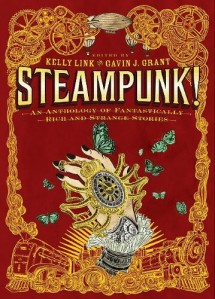 Steampunk!: An Anthology of Fantastically Rich and Strange Stories
Steampunk!: An Anthology of Fantastically Rich and Strange Stories
Edited by Kelly Link and Gavin Grant
Candlewick Press
I’ve read my share of steampunk anthologies, not all of them, but I’ve read more collections devoted to steampunk than any other specific SF niche. I may be wrong, but based on the essential reading lists I’ve seen floating around, this particular collection from Candlewick Press, published back in 2011, seems to get overlooked. It’s a shame, because it may be the most accessible and thoroughly pleasurable read out of the whole pack.
The content has a decided young adult orientation, which is unique from other anthologies, such as the three volumes edited by the Ann and Jeff Vandermeer and published by Tachyon Press, which bring a very “literary” sensibility to the subject matter. That’s not to say that the stories contained in this volume lack depth or literary merit, just that, on the whole, they feel less conscious of their own relationship to the genre, and exist more freely as vehicles for their respective narratives.
I also enjoyed the opportunity to read stories by authors who I am less likely to run into because they are mainly active in the YA market, like Cassandra Clare, Libba Bray, and Holly Black, alongside authors who I have long admired, but never read in a steampunk context, like Cory Doctorow, and the anthology’s co-editor, Kelly Link.
Back in the first paragraph I wrote that this anthology was one of the most accessible steampunk collections I’ve read. By that I meant that it conforms pretty neatly with what newcomers to steampunk prose would probably associate with the genre: clockwork automatons, airships, and steam engines abound, mostly in the context of a rollicking adventure or a whimsical fancy. In spite of their comfortable familiarity, these stories do not equate genre with generic. A sense of wonder and possibility runs through each narrative, but also an empowering subversion that is often meatier than their brassy veneer initially lets on.
Libba Bray’s “The Last Ride of the Glory Girls” tells the story of Adelaide Jones, a woman of the law embedded with a band of outlaws who use a fanciful “enigma apparatus” to manipulate time and rob trains. The wild west setting has a romance to it that appeals to the core idea of the steampunk fantasy, but the choices the characters face give it a relevance that extends beyond aesthetics. Adelaide faces a conflict between her duty to the Pinkerton Agency that employs her, and her new-found sisterhood with the Glory Girls, providing a meaty moral conflict that lends a strong resonance to the human drama of the story.
Less romantic is “Clockwork Fagin,” Cory Doctorow’s story set in an orphanage characterized by all means of Dickensian inequality and abuse. In this tale, the pitiful children overthrow their oppressive master and use their own ingenuity to create an autonomous steampunk utopia. In addition to its anarchic inclinations, the story makes use of hard computer science as a plot device, something relatively unique and refreshing in a genre where the “science” often involves aetherial energy sources, hollow earth theories, or inexplicable AI’s.
Throughout the collection authors continue to explore fresh settings for steampunk’s familiar literary constructs. Kelly Link’s “The Summer People” and Dylan Horrock’s “Steam Girl” each employ steampunk concepts in a modern setting as ways for their respective teenage protagonists to combat social exclusion and abusive parents, while M.T. Anderson’s “The Oracle Engine” constructs a steampunk tragedy set in Ancient Rome.
Also appreciated, are the two short comics included: Shawn Cheng’s “Seven Days Besot by Demons,” and Kathleen Jennings’ “Finishing School.” These comics are quite different from one another, but they both represent a stylistic maturity within the medium that should satisfy the steampunk and comic book enthusiast alike.
Being a YA anthology, the stories are light on (but not devoid of) “mature” content like sex and violence. that could be a deal breaker depending on your preferences, but if you’re like me, then mature storytelling is more important than mature content. If you fall into the latter camp, I would enthusiastically recommend this anthology for anyone looking for a comprehensive introduction to the genre.
Click here to read more steampunk reviews and essays!



 Posted by tvgilbert
Posted by tvgilbert